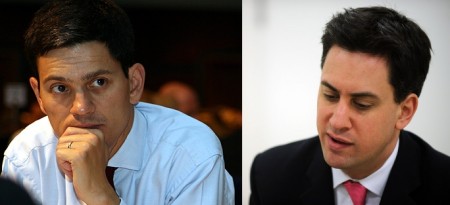
Most of us know a bit about sibling rivalry. Of course politics has never needed the familial part to inspire rampant competition and skullduggery. Nonetheless a number of siblings have managed to coexist while holding political office, John and Bobby Kennedy spring to mind along with the more recent Kaczynski twins in Poland. Few, though, have ever had to run against each other for their party’s top job.
For that challenge just ask David and Ed Miliband, the brothers whose participation in the British Labour party’s leadership election has consumed media coverage in a race with apparently few other marketable qualities. All we know for sure, or so the pundits would have you believe, is that the new leader will be a Miliband. The all important forename will be announced this Saturday 25 September when the campaign draws to a close.
It is perhaps unsurprising that, in a campaign that was meant to be about long-term goals and principles, much of the debate has descended into a reassessment of New Labour after its 13 years in power and recent electoral humbling. The Milibands have given their own variations on the past with ex-Foreign Secretary David (in some quarters known as the ‘heir to Blair’) taking a predictably more centrist position on the issues. For his part, Ed as the former Climate Change Secretary has carved out a position on the left of the field, despite his close links to former PM Gordon Brown, and set out plans that resonate with more traditional Labour voters.
Despite the inevitable focus on Labour’s economic stewardship, it is in international affairs and the perceived loss of moral authority where the party’s malaise poses the greatest challenge – both for the new leader and for the cause of balanced political debate. One only need feel the visceral response of party rank-and-file on the mention of Iraq to understand the lingering doubts that remain regarding Britain’s role in the world under New Labour.
Watch ordinary party members repel an attack on domestic policy and they are quick to respond with a statistic on public sector improvements. On international issues, however, thoughts turn quickly to the decisions of the post 9/11 era when thousands left the party in protest, and millions marched against a Labour government that had, until that time, been passionate about promoting its self-described ‘ethical foreign policy’.
In order to rebuild the party’s self confidence at responding to the key international questions of the day, it is time for the new leader to move his party’s narrative beyond the shameful episodes of Abu Ghraib, extraordinary rendition and complicity in torture. To do this, Mr Miliband must do more than advocate ‘values over alliances’ – the standard phrasing of the campaign – and instead steel his party to participate in the strategic review already underway regarding the UK’s fundamental global role.
A good start would be to remind his party of the pre 9/11 Labour government – a time when New Labour unapologetically asserted progressive principles on the world stage. As a result, it played a pivotal role in major international developments by being instrumental in, for instance, generating the international response to Kosovo, developing the ‘responsibility to protect’ principles, and instigating the process that would establish the EU capacity to intervene free from US influence.
Although David is the candidate most laden with the baggage of New Labour’s more controversial acts in foreign policy (both on torture and his vote for the Iraq war), there is little suggestion that either brother will engage in the traditional post-election ‘distancing’ of the victor from his closest rival. Nor should they, as their different support bases provide the key to remaking the party into a strong opposition that the country so requires.
In fact, quite the opposite is true as the brothers have openly defined their relationship during the campaign by exhortations of ‘brotherly love’ and ‘best friendship’ – cleverly encouraging popular fascination with the pair and so sucking the air out of their opponent’s media campaigns. Betting is already well underway over the likely position of the loser in his brother’s shadow cabinet.
For Marion Miliband, the ‘boys’ mother, Saturday’s announcement will bring some comfort to her worries over the strain of electoral competition on her sons’ relationship. For David and Ed, however, the benefits and complications of political brotherhood will continue beyond this round of sibling struggle – only time will tell if two Milibands really is better than one.

